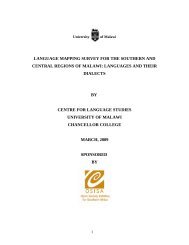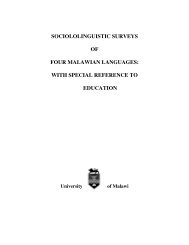languages and area spoken for chitipa - Centre for Language Studies
languages and area spoken for chitipa - Centre for Language Studies
languages and area spoken for chitipa - Centre for Language Studies
You also want an ePaper? Increase the reach of your titles
YUMPU automatically turns print PDFs into web optimized ePapers that Google loves.
In all the places that were visited, almost all older people said that they are very proud<br />
<strong>and</strong> com<strong>for</strong>table to be identified with their own local <strong>languages</strong>. They are always<br />
com<strong>for</strong>table speaking them wherever they go even outside Malawi as long as they have<br />
somebody to speak with. In Chitipa, Karonga, <strong>and</strong> Nkhata Bay, it is said that sometimes<br />
speakers of various <strong>languages</strong> converse while each uses their own language just because<br />
none of them wants to give up his own language by speaking that of his counterpart. The<br />
speakers are able to underst<strong>and</strong> each other’s language because they have lived side by<br />
side <strong>for</strong> some time. Even among the so called Cingoni speaking <strong>area</strong>s, its mainly elderly<br />
people that speak Cingoni. Most of the young men <strong>and</strong> women can hardly speak the<br />
language. These men <strong>and</strong> women argue that one can only be confident <strong>and</strong> com<strong>for</strong>table<br />
when they are speaking their own language. Furthermore, language bears one’s own<br />
culture, traditions <strong>and</strong> customs. Thus, if you don’t speak your language you kill it <strong>and</strong> by<br />
that your own identity in culture <strong>and</strong> traditions is lost. So, they believe that by<br />
maintaining their respective local <strong>languages</strong> they are propagating their own cultural<br />
identity. They also believe that each <strong>and</strong> everyone must be proud of their own language<br />
as characterized by their unanimous response when asked if they are happy to be<br />
identified by their respective local <strong>languages</strong>. They all said they are proud, happy <strong>and</strong><br />
com<strong>for</strong>table simply because they are their <strong>languages</strong>, <strong>and</strong> if they are not proud of them,<br />
then what do they have to be proud of? Why should they prefer another person’s<br />
language? Thus, the high degree of language loyalty also contributes to patterns of<br />
language choice <strong>and</strong> use among them.<br />
23





